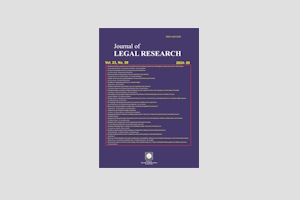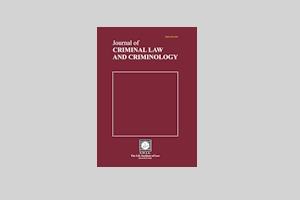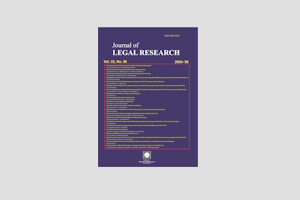Journal of
Criminal Law and Criminology
Number 19
Vol. 19 ● No. 1
Spring-Summer 2022
The Shahr -e- Danesh Institute of Law
Research and Study
(SDIL)
Managing Editor: Vahid Eshtiagh
Editor-in-Chief: Mohammad Ashoori
CONTENTS
Customary International Law: The Source of Substantive Rules in the Framework of the International Criminal Court
Dr. Homayoun Habibi – Saleheh Ramezani
Legislative and Judicial Challenges of Scientific Evidence in Iran’s Criminal law
Dr. Hassan-Ali MoazzenZadegan – Saeid Amiri
How They Turn into Criminals? (Explaining the Path of Criminal Transition in the Light of Developmental and Integrated Criminology)
Gelavizh Sheikholeslmi Vatani – Dr. Mohammad Ashouri – Dr. Nasrin Mehra – Dr. Mohammad Ali Mahdavi Sabet
The Dream of Deprivation of Liberty to The Aspects of Deterrence and Impunity of Punishment in The Light of The Law Reducing The Punishment of Imprisonment 1399
Hamid Alizadeh – Dr. Reza Nikkhah Sarnaghi – Dr. Mohammad Hasan javadi – Dr. Hesam Seyyed Esfahani
Economic Criminalization in the light of Institutional Economics
Rahim Yari – Dr. Nourooz Kargari – Dr. Bagher Shamloo – Dr. Ghasem Ghasemi
Historical Cognition on The Islamic Sharia Penal System of Ḥudūd and Qiṣāṣ in Light of Social Constructivism Theory
Mohammad Hassan Maldar – Dr. Abdoreza Javan Ja’afari Boojnordi – Dr. Seiyed Mohammad Jawad Sadati
Functions of The Special Restorative Police for Children: Comparative Study of Iran and Australian
Shadi Torkamani – Dr. Rouheddin Kordalivand
Relationship between Family Structure and Juvenile Delinquency (Field Study in Isfahan Correctional Center-2016)
Dr. Samira Golkhandan
State Crime or Governmental Crime; Verbal Difference or Fundamental Challenge
Dr. Nabiollah.Gholami
A Critique of The Discourse of The Iranian Legal System in The Face of The Challenges of Legislation and Enforcement of Limit Punishments
Mahdiar Rahmandoost, Dr. Mohammad Hossein Bayati
Judicial Supervision on Confirmation of Charges Process; Iranian and ICC Procedure Models
Dr. Iman Yousefi, Saeed Yousefi
Bringing Israeli Officials to the International Criminal Court On the Crime of Aggression
Dr. Abdollah Abedini
ABSTRACTS
Customary International Law: The Source of Substantive Rules in the Framework of the International Criminal Court
Dr. Homayoun Habibi
Associate Professor, Department of International Law, Faculty of Law and Political Sciences, Allameh Tabataba’i University, Tehran, Iran, Corresponding Author
Email: h_habibi@atu.ac.ir
Saleheh Ramezani
Ph.D. Student in Public International Law, Faculty of Law and Political Sciences, Allameh Tabataba’i University, Tehran, Iran..
Email: saleheh.ramezani@gmail.com
Abstract:
Contrary to the Statutes of the International Criminal Tribunals for the Former Yugoslavia and Rwanda, which specify only the jurisdiction of those tribunals and the Applicable Law should be sought elsewhere, Article 21 of the Rome Statute sets out the applicable law by the International Criminal Court (ICC). A noteworthy point in Article 21 is that there is no explicit reference to Customary International Law as a legal source applicable by the International Criminal Court, then some consider this silence to be an end to the role of Custom as a legal source in the ICC’s setting and International Criminal Law in general.
On the other hand, some still believe that the ICC can invoke Customary International Law as a substantive source of law. This article, after referring to other procedures of the International Criminal Tribunals and expressing opposing and agreeing views in International Criminal Law, finally shows that in special cases, invoking custom is the only way to exercise criminal jurisdiction over certain crimes and establish Individual Criminal Responsibility within the framework of the Statute of the International Criminal Court.
Keywords: Customary International Law, International Criminal Court, International Criminal Law, Legal Source, Individual Criminal Responsibility.
Legislative and Judicial Challenges of Scientific Evidence in Iran’s Criminal law
Dr. Hasan Ali Moazenzadegan
Associate Professor, Department of Criminal Law and Criminology, Faculty of Law and Political Science, Allameh Tabataba’i University, Tehran, Iran.
Email: ha.moazenzadegan@atu.ac.ir
Saeid Amiri
Ph.D. Student in Criminal Law and Criminology, Faculty of Law and Political Sciences, Allameh Tabataba’i University, Tehran, Iran, Corresponding Author
Email: s_amiri64@yahoo.com
Abstract:
One of the most important reasons for proving a crime is the use of scientific evidence in detecting and proving crimes and preventing them. There are several challenges to the application of this type of evidence in our criminal law, which by referring to existing texts through descriptive-analytical research and judicial review, legislative challenges and judicial challenges can be considered as the most important of them. It seems that the subjectivity of evidence as the most important challenge can overshadow the application of scientific evidence. The multiplicity of trustees and regulations in the field of expertise creates fragmentation and dissatisfaction, and the lack of privacy regulations can lead to the abuse of law by defendants and officers. The disregard for scientific evidence is partly rooted in the law and the opinions of jurists regarding scientific evidence. It must be acknowledged that there are also cases of adjournment of proceedings even when the use of scientific evidence is agreed upon, which is due to non-compliance with the rules governing expertise. It seems that the revision of the Islamic Penal Code in order to eliminate the subjectivity of evidence, not obliging the judge to issue a verdict based on thematic evidence, the adoption of privacy regulations when using scientific evidence, providing experienced manpower and their continuous training, providing sufficient funds and equipping cities to improve the quality of services provided by the Forensic Medicine Organization, Integrating the institutions and regulations governing the process and execution of expertise method, Increasing the monitoring of the performance of experts and their evaluation based on competence and also calculation of wages based on their ranking, can improve the efficiency of scientific evidence in Iranian criminal law.
Keywords: Scientific Evidence, Legal Evidence System, Spiritual Evidence System, Subjectivity of Evidence, Instrumentality of Evidence.
How They Turn into Criminals? (Explaining the Path of Criminal Transition in the Light of Developmental and Integrated Criminology)
Gelavizh Sheikholeslmi Vatani
Ph.D. Student in Criminal Law and Criminology , Faculty of Law Theology and Political Science , Science and Research Branch , Islamic Azad University , Tehran, Iran.
Email: gelavizh.sheikholeslami@gmail.com
Dr. Mohammad Ashouri
Professor, Department of Criminal Law and Criminology, Faculty of Law ,Theology and Political Science, Science and Research Branch , Islamic Azad University, Tehran, Iran, Corresponding Author
Email: m-ashouri@srbiau.ac.ir
Dr. Nasrin Mehra
Associate Professor, Department of Criminal Law and Criminology, Faculty of Law, Shahid Beheshti University , Tehran, Iran
Email: N_mehra@sbu.ac.ir
Dr. Mohammad Ali Mahdavi Sabet
Assistant Professor, Department of Criminal Law and Criminology, Faculty of Law, Theology and Political Science , Science and Research Branch , Islamic Azad University , Tehran, Iran
Email: m-mahdavisabet@srbiau.ac.ir
Abstract:
Everyone may have wondered many times why some people turn into criminals? Does the criminal have distinct aspects from other people? Paying attention to the length and flow of people’s lives means focusing on the sequence of roles, opportunities, limitations and events based on different age periods that form the life history from birth to death. In this study in order to explain the “How they become criminal”, the author is trying to explain and describe the process of committing anti-social behaviors which requires attention to various factors effective in committing a crime over time and focusing on three components; the growth of delinquency, risk factors in different age periods and the effects of important life events on the development of delinquency from the perspective of developmental and hybrid criminology.
Keywords: Crime Pattern, Developmental Approaches, Integrated Theories, Age and Crime Curves, Crime Predictors.
The Dream of Deprivation of Liberty to The Aspects of Deterrence and Impunity of Punishment in The Light of The Law Reducing The Punishment of Imprisonment 1399
Hamid Alizadeh
Ph.D. Student, Criminal Law and Criminology, Urmia University, Urmia, Iran.
Email: Ha.alizadeh@urmia.ac.ir
Dr. Reza Nikkhah Sarnaghi
Assistant Professor of Law, Urmia University, Urmia, Iran, Corresponding Author.
Email: r.nikkhah@urmia.ac.ir
Dr. Mohammad Hasan javadi
Assistant Professor of Law, Urmia University, Urmia, Iran.
Email: mh.javadi@urmia.ac.ir
Dr. Hesam Seyyed Esfahani
Assistant Professor of Criminal Law and Criminology, University of Moncton, Canada.
Email: hesam.esfahani@umoncton.ca
Abstract:
The tendency of Iran’s criminal policy and consequently its criminal policy is to reduce imprisonment and the prison population. In other words, Iran’s key priorities are to reduce the dominance of imprisonment. Accordingly, the legislative and judicial approach seeks the release of imprisonment and the use of compassionate and alternative institutions. Hence, the dream of deprivation of liberty has become the main goal of criminal policy today, and the predictions of compassionate institutions and the approach of the law to reduce the punishment of imprisonment confirm this approach. However, despite the move towards deprivation of liberty, it is important to keep this approach in line with the issue of deterrence and impunity or the purpose of punishment. Because with the reduction of punishments, the deterrent power of punishment also decreases. This article concludes that reducing the prison sentence without the development of a culture of legalism and attention to other factors affecting the increase in crime will not be possible to reduce the prison population. Therefore, the result of the law reducing the punishment of imprisonment, approved in 1399, is to reduce the deterrent power of punishment and help impunity for criminals. On the other hand, it has little effect on reducing the prison population. Because the production of crime and imprisonment is not the only result of long punishments that reduce the criminal population to achieve the desired result. Rather, the main components of crime and attention to alternatives to imprisonment should be considered.
Keywords: Detention, Deterrence, Impunity, Punishment, Punishment Reduction Law approved in 1399.
Economic Criminalization in the light of Institutional Economics
Rahim Yari
PhD student in Criminal Law and Criminology, Faculty of Law, Theology and Political Sciences, Science and Research Branch, Islamic Azad University, Tehran, Iran.
Email: Rahim.yari.ha@gmail.com
&
Dr. Nourooz Kargari
Assistant Professor, Department of Criminal Law and Criminology, Faculty of Law, Theology and Political Science, Science and Research Branch, Islamic Azad University, Tehran, Iran, Corresponding Author.
Email: Nouroozk@gmail.com
&
Dr. Bagher Shamloo
Associate Professor, Department of Criminal Law and Criminology, Faculty of Law, Shahid Beheshti University, Tehran, Iran.
Email: b-shamloo@sbu.ac.ir
&
Dr. Ghasem Ghasemi
Assistant Professor, Department of Criminal Law and Criminology, Faculty of Law, Theology and Political Sciences, Science and Research Branch, Islamic Azad University, Tehran, Iran.
Email: gh.ghasemi@srbiau.ac.ir
Abstract:
The challenge of economic crimes is important today in several ways, on the one hand, the role of the economy in shaping criminal law, the role of criminal law in supporting the economy and economic activities, the role of government policy in creating or preventing economic crimes and in a broader view Economic corruption and the role of culture (customs, values, religion and ideology) governing the economic system. It is a multi-axis issue that introduces the systemic approach of institutionalists in the analysis of economic variables. A Heterodox approach with dissident teachings to define a development model that makes the prevention of disruptive economic behaviors (economic crimes) possible only by identifying the fundamental institutions of the economic system (including economics, law, politics, culture) in any modern society. Inductive and Systematic study methods that with a pragmatic approach to economic facts instead of deductive, abstract and subjective studies, explains economic crimes in accordance with the economic and legal realities of society, which is a suitable version for comprehensive, rapid and consistent criminalization.With economic developments and in accordance with specific institutions, the economic system governs the social system.
Keywords: Economic Crimes, Institutional Economics, Economic Criminal law, Criminalization.
Historical Cognition on The Islamic Sharia Penal System of Ḥudūd and Qiṣāṣ in Light of Social Constructivism Theory
Mohammad Hassan Maldar
Ph.D. Student in Criminal Law and Criminology, Faculty of Law and Political Science, Ferdowsi University, Mashhad, Iran
Email: mohammadhasan.maldar@mail.um.ac.ir
Dr. Abdoreza Javan Ja’afari Boojnordi
Associate Professor, Department of Criminal Law and Criminology, Faculty of Law and Political Science, Ferdowsi University, Mashhad, Iran, Corresponding Author.
Email: Javan-j@um.ac.ir
Dr. Seiyed Mohammad Jawad Sadati
Assistant Professor, Department of Criminal Law and Criminology, Faculty of Law and Political Science, Ferdowsi University, Mashhad, Iran
Email: mj.sadati@um.ac.ir
Abstract:
Like most social norms, Punishment is also rooted in human history and is old as society itself, so it should be considered a “socio-historical structure”. Thus, no punishment should be considered a Religion invention. In actuality, any kind of punishment comes to put Intended values and norms in place. Different religions including Islam verified and support these laws for social necessity. This article suggests the Islamic penal system is influenced by the Collective conscience’s desire for crime punishment and showing-off ruler dominance. so contrary to stereotypes and sanctifying ideas about Islamic criminal law, Punishment is a social phenomenon formed in response to the people’s needs at that specific time and was an extension of the ruling power. That means due to collective conscience approval and ruling power utilization, those types of punishment were justified in the Age of Jahiliyyah social relation. Now if we take previous statements as a fact then it seems so obvious that the Troubled Penal systems of Islamic countries like Iran need reform in sync with accepted human rights laws. In other words, with a historical perception and away from subjectivism in this field, the system of punishment based on the elements of the contemporary world must be implemented.
Keywords: historicity, corporal punishment, Human Law, Collective conscience, power.
Functions of The Special Restorative Police for Children: Comparative Study of Iran and Australia
Shadi Torkamani
Ph.D. Student in Jurisprudence and Penal Law, Faculty of Law, Damghan Branch, Islamic Azad University, Damghan, Iran
Email: Shadi.torkamani@yahoo.com
Rouheddin Kordalivand
Assistant Professor, Department of Criminal Law and Criminology, Faculty of Law, Tarbiat Modares University, Tehran, Iran, Corresponding Author
Email: r.kordalivand@modares.ac.ir
Abstract:
Restorative justice with key functions along with traditional criminal justice has various outcomes for the criminal justice system. Hence, the various purposes of restoration have gained wide dominance over criminal law. Therefore, the use of restorative mechanism instead of referring to formal justice with the use of juvenile restorative police has highlighted the role of restorative justice and its restorative effects are reflected in children’s regulations. Establishment of a Juvenile Correctional Police is essentially an independent official body responsible for responding to juvenile delinquency and delinquency. The juvenile rehabilitation police seek to resolve the issue and deter children from the disadvantages of formal judicial proceedings by using the remediation mechanism instead of referring them to formal institutions. Importantly, Australia has a variety of mechanisms. In fact, in this mechanism, due to the components of restorative justice and the use of restorative mechanisms such as discourse-building, tripartite meetings, awareness-raising and self-centered training without formal judicial review is on the agenda. The bill for the juvenile police of Iran also emphasizes restorative police and accepts non-judicial proceedings.
Keywords: Restorative Justice, Restorative Policing, Children, Making Discourse, Self-Awareness, Mediation.
Relationship between Family Structure and Juvenile Delinquency (Field Study in Isfahan Correctional Center-2016)
Dr. Samira Golkhandan
Assistant Professor, Faculty Member in Department Criminal and Criminology, Faculty of Law, Khomein Branch, Islamic Azad University, Khomein, Iran
Email: Samira.Golkhandan@iau.ac.ir
Abstract:
The family, as the first social unit and the smallest, is the only social structure with continuity and harmony that has existed for a long time in human life and fulfills the most important vital human needs and establishes its social relations. The structures of the family and the conditions that govern it have an undeniable impact on the behavior and future of children and their delinquency. This study was conducted, with the aim of investigating the effect of family role on juvenile delinquency of Isfahan Education Reform Center and with descriptive survey-analytical correlation research method (descriptive and inferential statistics) using SPSS software with three hypotheses, family structure (single parent, Economic, Population and immigration), parental characteristics (delinquency, addiction and behavior) and family ecology. The results show that there is a significant relationship between family structure of single parent type with paternal death, parental characteristics and family ecology.
Keywords: Family, Delinquency, Juvenile, Isfahan Correctional Center.
State Crime or Governmental Crime; Verbal Difference or Fundamental Challenge
Dr. Nabiollah.Gholami
Ph.D. in Criminal Law and Criminology, Faculty of Law and Political Science, Allameh Tabataba’i University, Tehran, Iran
Email: Nabiollah.Gholami@yahoo.com
Abstract:
In the domestic criminology literature, at least two terms have been used for crimes committed by the power structure: State Crime and Governmental crime, both of which are referred to as the equivalent of the Latin term “State Crime”. Although in appearance it can be considered as a broad concept of government, the two terms mentioned are considered compatible with each other However, the existence of objective and practical effects such as the possibility of separating these two concepts from similar concepts, differences in type and the nature of responding to the crimes committed against them and the difference in the reference for responding to these crimes, and determining the responsibility (including political, administrative and legal), etc., distinguishing between these two concepts and determining the limits and limits of these two concepts Makes it necessary. In the present article, with the analytical-descriptive method and the use of library resources, and with reference to internal and external crime texts in the field of State crimes, as well as by reviewing domestic legal documents, it has been concluded that the use of the term “State crime” is more correct for the Latin term, both in terms of scientific and practical works and in terms of compliance with domestic legal text.
Keywords: State crime, governmental crime, harm, prevention, State.
A Critique of The Discourse of The Iranian Legal System in The Face of The Challenges of Legislation and Enforcement of Limit Punishments
Mahdiar Rahmandoost
Ph.D. Student in Criminal Law and Criminology, Faculty of Law, Adalat University, Tehran, Iran, Corresponding Author
Email: mr.rahmandoost@ut.ac.ir
Dr. Mohammad Hossein Bayati
Associate Professor, Faculty Member, Department of Jurisprudence and Law, Faculty of Theology, Adalat University, Tehran, Iran.
Email: bayati@edalat.ac.ir
Abstract:
Legislation and implementation of some Islamic punishments have faced various challenges for the Islamic Republic of Iran and its legal and judicial system. These challenges can be divided into two parts. Some of them are problems caused by negative reactions to the implementation of the limits, and what has always been the concern of the government has been to find a solution for these reactions. However, it can be said that the static limits that result from the legislator’s commitment to their jurisprudential background have created more important problems, and that is the imbalance in criminal law. This imbalance limits the scientific approach to punishment, confuses criminal policy, and impedes the administration of justice. In this article, after referring to the reflections in the implementation of the limits, we will deal with the problems that such punishments have created in our legal and judicial system. Then, we will categorize different discourses in the field of legislation and implementation of boundaries and explain and examine the approach of the Iranian legal system in this field.
In the following, we will explain, review and evaluate the type of confrontation of the Iranian legal system in this regard. Then we deal with the basics of the common approach, ie the need to stop implementing the limits based on the most important interests and their evaluation and critique. Finally, by concluding the discussion, we present some critiques of the discourse of the criminal justice system regarding challenging Islamic punishments.
Keywords: Limit Punishments, Islamic punishments, Islamic Penal Code, Enforcement of Limits, Penal policy.
Judicial Supervision on Confirmation of Charges Process; Iranian and ICC Procedure Models
Iman Yousefi
Ph.D. in Criminal Law and Criminology, Faculty of Law and Political Sciences University of Tehran, Tehran, Iran, Corresponding Author
Email: iman.usefi@yahoo.com
Saeed Yousefi
. Student of Criminal Law and Criminology, Faculty of Law and Political Sciences, University of Shiraz, Shiraz, Iran
Email: saeedyousefi@hafez.shirazu.ac.ir
Abstract:
Two models of pretrial investigation with and without judicial supervision are used in ICC and Iran criminal procedure. Judicial supervision means the existence of an independent judicial authority at the preliminary investigation stage that does not interfere with the gathering of evidence, and usually hears the prosecutor at three stages of privacy entry, breaches of liberty and committal the case to trial after investigation. Pretrial chamber in ICC is responsible for hearing the prosecutor’s request to announce the end of the pretrial investigation and send the case to the next stage; while in the Iranian procedure, decision of investigation judge and approval by prosecutor is sufficient and no other stage is considered before the start of the trial. The presence of a supervising judge on privacy and liberty is in line with fair trial standards, and the intervention of this authority in announcing the end of the investigation will prolong the trial. As a result, the Iranian procedure is better than the International Criminal Court procedure in this area, and of course it faces this challenge that instead of reasonable suspicion criterion, it uses the criterion of proving beyond any reasonable doubt at the end of this stage.
Keywords: Judicial supervision, Pretrial chamber, Pretrial investigation end, Prosecutor, Investigation judge.
Bringing Israeli Officials to the International Criminal Court On the Crime of Aggression
Dr. Abdollah Abedini
Faculty Member of the Institution for Research and Development in the Humanities (SAMT), Tehran, Iran.
Email: a.abedini@samt.ac.ir
Abstract:
During decades of occupation, Israel’s actions, including annexation of the West Bank, are considered a crime of aggression, with consequences for Israel both in terms of international responsibility law and criminal responsibility. In this article, we discuss the criminal responsibility of the Israeli authorities in this regard. This article, based on a descriptive-analytical method, first describes the events and then analyzes the annexation of the West Bank in the light of the provisions of the International Criminal Court in the light of the crime of aggression. The present article focuses on the possibility of raising the issue in the International Criminal Court due to the annexation of parts of the West Bank to Israel. According to the paper, the substantive and procedural conditions for investigating the crime of aggression in connection with the annexation are provided in the International Criminal Court, and the Court can examine the crime of aggression alongside war crimes and crimes against humanity.
Keywords: Annexation, Occupying Power, West Bank, Aggression, International Criminal Court.





